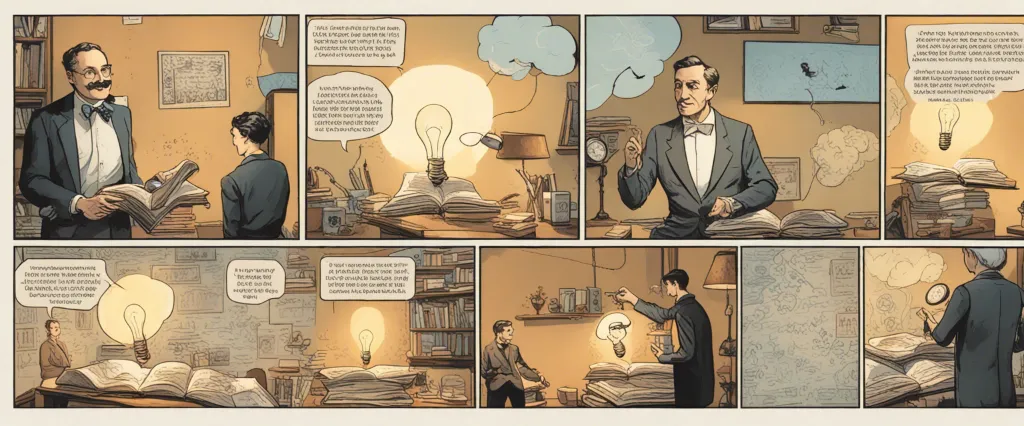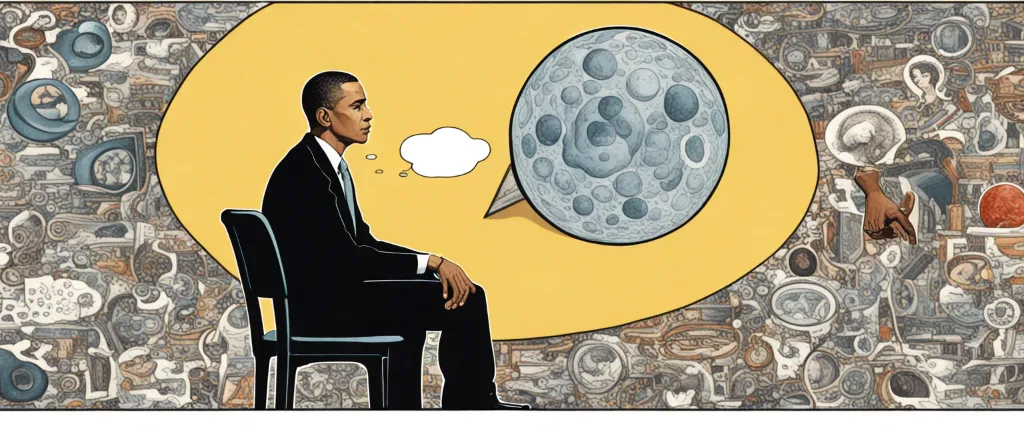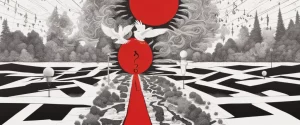
In the vast tapestry of literature, there are certain books that transcend the boundaries of time, geography, and culture, resonating with readers across generations. Such books hold within their pages the power to evoke profound emotions, ignite intellectual discussions, and shed light on the intricate complexities of the human condition. Stefan Zweig’s autobiographical memoir, “The World of Yesterday,” and Barack Obama’s enthralling memoir, “A Promised Land,” are two such remarkable literary works that captivate readers with their poignant narratives and thought-provoking insights.
“The World of Yesterday” by Stefan Zweig is a deeply personal account of the author’s life, which vividly recounts the final decades of the Habsburg Empire, World War I, and the tumultuous interwar period. Zweig’s memoir offers a unique perspective, brimming with nostalgia for a vibrant world that was irrevocably lost due to the cataclysmic events of the 20th century. By exploring themes of love, friendship, art, and the devastating consequences of war, “The World of Yesterday” presents a powerful and introspective reflection on the transience of human existence.
On the other hand, “A Promised Land” by Barack Obama provides an insider’s account of his presidential journey, navigating the complexities of governance, making difficult decisions, and shaping contemporary American history. With eloquence and candor, Obama delves into his personal thoughts and experiences, offering a glimpse into the intricacies of political leadership and the challenges that come with it. Through his memoir, Obama delivers a compelling narrative, combining personal anecdotes, policy discussions, and reflections on race, identity, and democracy, to ultimately present an inspiring vision for a more inclusive and progressive society.
While separated by time, space, and subject matter, these two works share common threads that make them worthy of comparative analysis. Both authors employ the art of storytelling to illuminate the triumphs and tragedies of their lives, while also examining the broader socio-political contexts in which they lived. Additionally, both Zweig and Obama possess a remarkable ability to capture the emotions and aspirations of their respective eras, compelling readers to reflect on humanity’s collective past and contemplate the future.
In this comparative study, we aim to delve into the overlapping themes of Zweig’s “The World of Yesterday” and Obama’s “A Promised Land,” analyzing the authors’ narrative techniques, exploring the cultural and historical contexts that influenced their stories, and examining the ways in which their personal journeys intersect with societal transformations. By undertaking this comparative journey of these two extraordinary literary works, we hope to gain a deeper understanding of the universal human experiences that lie beneath the surface of both books and explore the profound impact of personal narratives within the broader tapestry of history.
As we embark on this enlightening journey through time and literature, we shall discover the unique perspectives and profound wisdom that Zweig and Obama offer, reminding us of the inherent power of words in shaping our understanding of ourselves and the world we inhabit.
Brief Summary of Two Books
The World of Yesterday by Stefan Zweig
“The World of Yesterday” by Stefan Zweig is an autobiographical account of his life and the tumultuous times he lived through. Zweig, an Austrian writer, recounts his life from the late 19th century into the early 20th century, providing a vivid depiction of the intellectual and cultural climate in Europe during that time.
Zweig begins by describing his childhood in Vienna, where he experienced a vibrant cultural scene and a conducive environment for artistic and intellectual pursuits. He then explores his travels and encounters with influential figures like Sigmund Freud, Rainer Maria Rilke, and many others who shaped the literary and cultural landscape of the era.
As the narrative progresses, Zweig delves into the rise of nationalism and the dark shadow of anti-Semitism in Europe. He chronicles the outbreak of World War I and the subsequent disintegration of the Habsburg Empire, which greatly impacted the sentiments and lives of individuals across the continent.
Zweig’s personal life also takes center stage as he recounts his failed marriages, his relentless pursuit of love and passion, and his struggles with inner demons. While he seeks solace in literature and intellectual pursuits, Zweig experiences an increasing disillusionment with the apocalyptic events that unfold around him.
With the rise of fascism and the outbreak of World War II, Zweig becomes a stateless refugee. Facing growing despair and uncertainty, he paints a picture of a world collapsing into chaos and violence. Ultimately, in 1942, disillusioned and unable to find hope in humanity’s future, Zweig takes his own life.
Overall, “The World of Yesterday” is a poignant and introspective account of a man’s life, set against the backdrop of a changing Europe plagued by political turmoil and the eroding of cultural values. It serves as both a personal memoir and a historical document, offering insights into the intellectual and emotional responses of individuals grappling with such a tumultuous time.
A Promised Land by Barack Obama
“A Promised Land” is a memoir by Barack Obama, the 44th President of the United States, covering the first part of his political career, leading up to his presidency. The book delves into the personal and political challenges he faced, as well as his achievements, hopes, and aspirations during his early life, campaign, and first term in office.
The book begins by exploring Obama’s background, upbringing, and early experiences in politics. He shares stories of his childhood in Hawaii and his diverse upbringing, including his mixed-race heritage and connection to his African roots. Obama also reflects on his college years and the influences that shaped his worldview.
Moving into his political journey, Obama highlights his work as a community organizer in Chicago and his decision to run for public office. He recounts the victories and setbacks of his campaigns for the Illinois State Senate and the United States Senate, shedding light on the challenges faced by a young, ambitious, and relatively unknown politician.
As he transitions into the presidential race, Obama shares intimate details about his decision-making process, the complex dynamics of a modern campaign, and the critical issues he sought to address. The book dives into the historic significance of his presidency as the first African American to hold the highest office in the United States, emphasizing the weight of expectations and the pressure to fulfill promises.
“A Promised Land” provides a behind-the-scenes look at the early years of Obama’s presidency, offering insights into domestic and foreign policy decisions. Obama discusses his efforts to pass essential legislation, such as the Affordable Care Act, the economic recovery package, and the rescue of the American auto industry. He also addresses the complex situations he faced internationally, including the wars in Iraq and Afghanistan and the global financial crisis.
Throughout the book, Obama reflects on the personal toll of his presidency, delving into the strains on his family, the constant scrutiny, and the unrelenting demands of the job. He provides personal anecdotes and introspective moments that reveal his inner thoughts, doubts, and determination.
In summary, “A Promised Land” is a well-crafted memoir that offers readers a detailed and introspective account of Barack Obama’s rise to power, his historic presidency, and the complexities of governing the United States during a transformative period in history.
Comparison between Two Books

Similarities in Memoirs
Both The World of Yesterday by Stefan Zweig and A Promised Land by Barack Obama are memoirs that offer readers a personal perspective on significant historical and political events.
1. Reflective Tone: Both memoirs employ a reflective tone, as the authors recount their personal experiences and delve into their internal thoughts and emotions. They both provide introspection on the events they witnessed, offering insights into how those experiences shaped their perspectives and decisions.
2. Historical Context: Both books provide a historical context for the events they describe. Zweig’s memoir spans from the end of the 19th century to the outbreak of World War II, while Obama’s memoir focuses on his political career leading up to and during his presidency. In both cases, the authors provide a first-hand account of major historical events and shed light on their significance.
3. Sociopolitical Commentary: Both authors use their memoirs as a platform to discuss wider sociopolitical issues. Zweig explores the rise of nationalism and fascist ideologies that led to World War I and World War II, while Obama delves into topics such as racial inequality, healthcare reform, and foreign policy decisions during his presidency. Both authors offer insightful commentary on these issues from their own unique perspectives.
4. Personal Growth and Challenges: Both memoirs reveal the personal growth and challenges faced by the authors. Zweig’s memoir details his struggle with the increasing political unrest in Europe and the loss of his idealized vision of a peaceful and cultured society. Obama’s memoir, on the other hand, shares his journey from a young community organizer to becoming the first Black president of the United States, highlighting the obstacles he encountered along the way.
5. Literary Style: Both authors employ skilled storytelling and vivid descriptions to engage readers emotionally. Zweig’s prose is often poetic, while Obama’s writing is characterized by his eloquence and ability to convey complex ideas with clarity. These literary styles enhance the memoirs, making them compelling and immersive reads.
In summary, The World of Yesterday and A Promised Land share similarities as memoirs in terms of their reflective tone, historical context, sociopolitical commentary, exploration of personal growth and challenges, and their engaging literary styles. These qualities allow readers to gain a deeper understanding of the authors’ lives and the historical events they lived through.
Divergences in Memoirs
Both The World of Yesterday by Stefan Zweig and A Promised Land by Barack Obama can be classified as memoirs, as they are written by the respective authors to reflect upon their own personal experiences and offer insights into significant historical events. However, there are notable divergences in the approach, tone, and purpose of the memoirs between these two books.
The World of Yesterday, written by Zweig, is a deeply introspective and lyrical memoir that delves into the author’s personal life and experiences against the backdrop of a crumbling Europe during the first half of the 20th century. Zweig uses his prose to capture the cultural, social, and political diversity of Europe, highlighting the beauty of a bygone era and the subsequent horrors that followed. The memoir has a melancholic tone, as Zweig reminisces about a world that was lost to war and violence. The focus primarily lies on Zweig’s personal life, his relationships, and his observations as a keen observer of his time.
In contrast, A Promised Land by Obama is a more contemporary and politically focused memoir. It chronicles Obama’s early political career, leading up to his presidency, and the subsequent challenges faced during his first term. Obama’s memoir takes a more pragmatic and analytical approach, offering a nuanced insight into the political landscape and policy decisions of his presidency. While personal anecdotes and reflections are present, they serve to contextualize the political events rather than overshadow them. The memoir also emphasizes the importance of hope, unity, and the power of ordinary citizens to bring about change.
Another significant divergence is the historical periods covered by these memoirs. The World of Yesterday provides a detailed account of pre-World War I Vienna, the interwar period, and Zweig’s eventual self-imposed exile due to the rise of Nazism. On the other hand, A Promised Land primarily focuses on Obama’s political journey and presidency from 2004 to 2011, offering a contemporary perspective on events that are still fresh in the minds of readers.
Furthermore, the overall purpose of these memoirs varies. Zweig’s memoir serves as a nostalgic lamentation for a lost world, while also delivering a cautionary tale about the dangers of nationalism and authoritarianism. In contrast, Obama’s memoir aims to provide a firsthand account of his presidency and the challenges faced during his time in office. It provides insight into his policy decisions, the complexities of the political system, and explores how one individual can navigate and make a difference in a highly polarized world.
In conclusion, while both The World of Yesterday by Stefan Zweig and A Promised Land by Barack Obama are memoirs, they diverge significantly in terms of their focus, tone, historical periods covered, and overall purpose. Zweig’s memoir is deeply personal and introspective, capturing a lost era, while Obama’s memoir is more politically oriented, providing an analytical perspective on his presidency.

Conclusion
“The World of Yesterday” is an autobiography/memoir by Stefan Zweig, written during his exile from Europe after World War II. In this poignant and reflective work, Zweig reflects on the lost world of pre-war Europe, its intellectual and cultural achievements, and the impact of war on the human spirit. It is highly regarded for its vivid descriptions and personal insights into the decline of European civilization.
“A Promised Land” is the first volume of Barack Obama’s presidential memoirs, focusing on his early political career and his first term in office as the 44th President of the United States. It provides an inside look at the challenges, triumphs, and complexities of American politics, both domestically and internationally. Obama shares his personal reflections on his presidency, the economic crisis, healthcare reform, foreign policy, and more.
The decision between these books ultimately depends on your personal preferences. If you are interested in the historical and cultural aspects of pre-war Europe, as well as the human impact of war, “The World of Yesterday” might be the better choice. On the other hand, if you are more interested in recent American political history and want an in-depth understanding of Barack Obama’s presidency, “A Promised Land” is likely to be the more appealing option.
Consider your interests and what you hope to gain from reading, and that will help guide your decision. Ultimately, both books offer unique perspectives and valuable insights, so choosing either one should provide an enriching reading experience.


